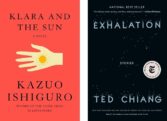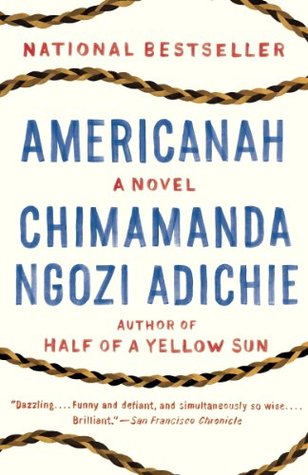
by by Margaret Kolb

Published by Alfred A. Knopf, 2013 | 477 pages
In Americanah’s opening pages, Ifemelu—lingering in Princeton following the completion of a postdoctoral fellowship—is looking to get her hair braided. Her first stop is a boutique Princeton salon, which she finds to be unfamiliar with braiding technique. Instead, she must travel to blue-collar Trenton, where she struggles to identify with the braid shop’s Malian and Senegalese hairdressers. Americanah, told through a remarkable sequence of (similarly resonant) everyday situations, accomplishes in its portrayal the analysis of contemporary life as experienced by black Americans and the broader black African diaspora. Throughout the book, as in this examination of kinky-curly hair and hairdressing culture, Chimamanda Ngozi Adichie brilliantly uproots the ideologically imposed black/white dichotomy, thereby illuminating the complexities of twenty-first-century African émigré identity politics.
Ifemelu, the novel’s heroine and protagonist, is both a refugee from a Nigeria wracked by military dictatorship and a young blogger (her anonymous blog is named “Raceteenth or Various Observations About American Blacks (Those Formerly Known as Negroes) by a NonAmerican Black”). When Americanah opens, she is dating Blaine, a black American and professor at Yale, a relationship of mutual affection and misunderstanding. Simultaneously, however, she longs to return to her brilliant ex-lover, Obinze, still living in Nigeria, who she refers to as “Ceiling.” Instead, Ceiling travels to the United States, but is denied entry by US immigration; dispirited, he moves to London, where he works as a janitor and lives as an undocumented immigrant. Eventually both Ifelemu and Obinze return to Nigeria to rekindle their romance and reintegrate into their troubled homeland.
Americanah examines the role the idea(l) of American citizenship plays in the minds of an atypical class of the African diaspora, one that modern cultural theorists have labeled the Afropolitan—the cosmopolitan African. This term refers to an educated, often affluent generation with a contemporary global outlook. In its typical portrayal in the Western media, the term is a romanticization, a misleading promise to the world of swift and easy incorporation into Western capitalism. The reality, as Adichie masterfully portrays it, is quite different: dissatisfaction, failure to assimilate, exploitation. Ifemelu’s Aunt Uju, for example, a medical practitioner by vocation who immigrated to America to raise her son, now works three jobs. Obinze himself, contemplating his desire to live in America, acknowledges that he has always “loved America from afar.” Upon returning to Nigeria, Ifemelu and Obinze find America referred to as a place where Africans go and are “lost.”
In Adichie’s debut novel, Purple Hibiscus, published more than a decade ago, the plot was largely constrained to postcolonial Nigeria. Americanah broadens out upon a global setting, reflecting Adichie’s experiences outside her homeland. Nor is the text specifically concerned with the experience of life as an émigré in America. Instead, Adichie’s main concern here is the ideological construct that would situate/confine identities to a rigid black/white dichotomy. Blackness as lived in Nigeria is portrayed as ontologically problematic as it is elsewhere, the cultural intersections of the modern world nullifying any fixed notion of what it would mean to be in any simple and unambiguous sense.
In her classic essay “Black is a Woman’s Color,” bell hooks provides an account of the ritual of hair maintenance as a “rite of passage” for women of African descent. It establishes, she notes, a time and place where women can gather without men, in order to, as hooks writes, “meet each other’s needs, to make each other beautiful in whatever way we can.” Hair maintenance in this interpretation ceases to be an issue of mere aesthetics, blossoming into a function of deep cultural importance in African, African American, and American African (as one character, Kofi, a Ghanaian self-identifies, to distinguish himself from those in America whose ancestors were slaves) culture. In Americanah, Adichie brilliantly illustrates the ways in which political, economic, and cultural asymmetries impinge upon such rituals. Ifemelu, at one point, tells her friend Ruth about an exciting job prospect in Baltimore. Ruth replies: “My only advice? Lose the braids and straighten your hair. Nobody says this kind of stuff but it matters. We want you to get that job.” Ifemelu conforms. Afterward, in a scene of tremendous emotional—and political—resonance, Ifemelu looks in the mirror and, momentarily, fails to recognize herself. Even after she is offered the job, she finds herself wondering if she would have been hired had she “walked into that office wearing her thick, kinky, God-given halo of hair, the Afro.” Such is the power of Adichie’s text that we witness within it all the intensity, power, and complexity of lived experience.
Chisomo Kalinga is a PhD candidate at King’s College London. Her research focuses on the cultural representations of HIV/AIDS narratives produced by Malawian and New York City-based writers.















click to see who
MAKE Magazine Publisher MAKE Literary Productions Managing Editor Chamandeep Bains Assistant Managing Editor and Web Editor Kenneth Guay Fiction Editor Kamilah Foreman Nonfiction Editor Jessica Anne Poetry Editor Joel Craig Intercambio Poetry Editor Daniel Borzutzky Intercambio Prose Editor Brenda Lozano Latin American Art Portfolio Editor Alejandro Almanza Pereda Reviews Editor Mark Molloy Portfolio Art Editor Sarah Kramer Creative Director Joshua Hauth, Hauthwares Webmaster Johnathan Crawford Proofreader/Copy Editor Sarah Kramer Associate Fiction Editors LC Fiore, Jim Kourlas, Kerstin Schaars Contributing Editors Kyle Beachy, Steffi Drewes, Katie Geha, Kathleen Rooney Social Media Coordinator Jennifer De Poorter
MAKE Literary Productions, NFP Co-directors, Sarah Dodson and Joel Craig